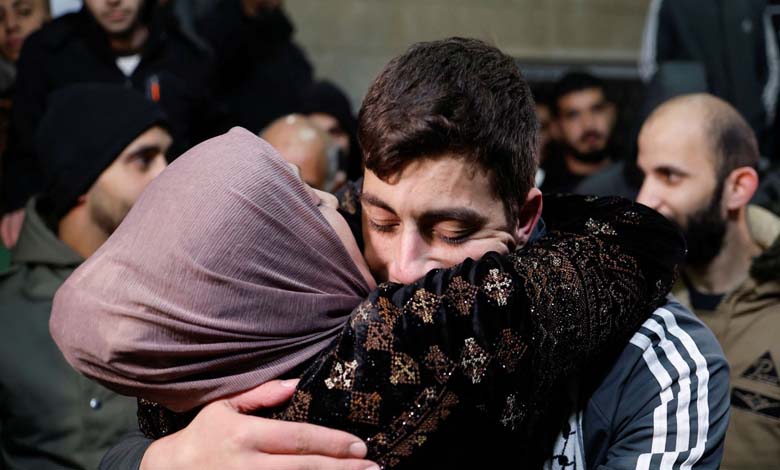Palestinian released prisoners: This is what happened to detainees in Israeli prisons after October 7th

Palestinian detainees released by Israel under the humanitarian ceasefire reached with the Palestinian movement Hamas spoke about the “ill-treatment” in Israeli prisons, confirming that the situation became “worse” after Hamas attacks on October 7th.
Israa Jaabis, imprisoned since 2015 after being convicted of detonating a bomb that injured an Israeli police officer, suffered severe burns on her face and hands.
She was sentenced to 11 years in prison for that incident, and she was released as part of the deal, which also included the release of captives held by Hamas in Gaza. Jaabis described the conditions inside the prison where she was held as “bad.” She said, “Female prisoners are in a really bad situation, and Israeli Arab women know nothing about the movements of female prisoners and do not know how to deal with the guards.”
Shorouq Dweiat was released from prison after serving half of her 16-year sentence for stabbing an Israeli and attempting to stab another in the Old City of Jerusalem in 2015. Her family says she acted “in self-defense after a man approached her, tried to remove her headscarf, and shot her.”
Dweiat said that she will now train to become a lawyer “to help other Palestinians who are victims of Israeli occupation.”
She mentioned that the conditions in prison “worsened after October 7th,” saying, “Male guards beat and persecuted the female prisoners,” citing Alhurra’s website.
She added that she “fears that the Israelis will try to imprison her again,” saying, “My biggest fear is to be arrested again because they have already threatened me with that, and they could raid the house at any moment.”
Hamas had reached an agreement with Israel for a (4)-day ceasefire, extended for two additional days, in exchange for the release of kidnapped hostages in the sector and the release of Palestinian prisoners in Israel.
Under the agreement’s terms, Hamas announced that it would initially release 50 women and children under the age of 19 who were kidnapped in the Hamas attack on southern Israel on October 7th.
Israel has been conducting intensive airstrikes on the Gaza Strip, accompanied since October 27th by extensive ground operations within the sector, resulting in the deaths of more than 15,000 people, mostly civilians, including women and children, according to the health authorities in the sector.
It is estimated that there are about 7,000 Palestinians in Israeli prisons, including (2,000) prisoners under administrative detention.
Administrative detention, a controversial procedure inherited from the British mandate, allows Israel to imprison individuals without charging them, for 3 to 6 months, and often the detention is extended continuously, according to Agence France-Presse.
Ghanem Abu Ghanem was arrested a year ago on charges of throwing stones at an Israeli bus before being released as part of the deal as well. His family says Ghanem has never been convicted.
Ghanem said that the situation in Israeli prisons has become “much worse” since the Hamas attacks on October 7th, adding, “The prison was humiliating; they beat us from the start of the war, and they treated us like dogs.”












